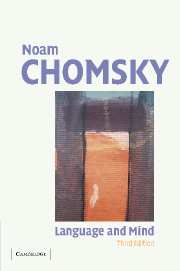Book contents
- Frontmatter
- Contents
- Preface to the third edition
- Preface to the second edition
- Preface to the first edition
- 1 Linguistic contributions to the study of mind: past
- 2 Linguistic contributions to the study of mind: present
- 3 Linguistic contributions to the study of mind: future
- 4 Form and meaning in natural languages
- 5 The formal nature of language
- 6 Linguistics and philosophy
- 7 Biolinguistics and the human capacity
- Index
3 - Linguistic contributions to the study of mind: future
Published online by Cambridge University Press: 04 September 2012
- Frontmatter
- Contents
- Preface to the third edition
- Preface to the second edition
- Preface to the first edition
- 1 Linguistic contributions to the study of mind: past
- 2 Linguistic contributions to the study of mind: present
- 3 Linguistic contributions to the study of mind: future
- 4 Form and meaning in natural languages
- 5 The formal nature of language
- 6 Linguistics and philosophy
- 7 Biolinguistics and the human capacity
- Index
Summary
In discussing the past, I referred to two major traditions that have enriched the study of language in their separate and very different ways; and in my last lecture, I tried to give some indication of the topics that seem on the immediate horizon today, as a kind of synthesis of philosophical grammar and structural linguistics begins to take shape. Each of the major traditions of study and speculation that I have been using as a point of reference was associated with a certain characteristic approach to the problems of mind; we might say, without distortion, that each evolved as a specific branch of the psychology of its time, to which it made a distinctive contribution.
It may seem a bit paradoxical to speak of structural linguistics in this way, given its militant anti-psychologism. But the paradox is lessened when we take note of the fact that this militant anti-psychologism is no less true of much of contemporary psychology itself, particularly of those branches that until a few years ago monopolized the study of use and acquisition of language. We live, after all, in the age of “behavioral science,” not of “the science of mind.” I do not want to read too much into a terminological innovation, but I think that there is some significance in the ease and willingness with which modern thinking about man and society accepts the designation “behavioral science.
- Type
- Chapter
- Information
- Language and Mind , pp. 57 - 87Publisher: Cambridge University PressPrint publication year: 2006
- 3
- Cited by

